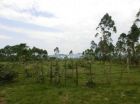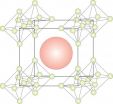(Press-News.org) By 2050, deforestation could cause temperatures in the Congo Basin to increase by 0.7 °C. The increase would intensify warming caused by greenhouse gases by half, according to a study by researchers at the University of Leuven, Belgium.
Explosive population growth and inefficient agricultural practices are causing large-scale destruction of tropical rainforests in Central Africa. A team of researchers from the University of Leuven examined how these practices will affect longer-term temperatures in the region. Using a sophisticated computer model, they forecasted Congo Basin temperatures anno 2050.
Their findings: Central Africa of 2050 will be an average of 1.4 °C hotter than today as a result of global greenhouse gas emissions. Deforestation will add an extra 0.7 °C to that figure.
The results also show a strong spatial correlation between deforestation and global warming. In certain deforestation 'hot spots', increases caused by deforestation could rise to 1.25 °C, in addition to the warming caused by greenhouse gases. Such drastic temperature increases will drive off plant and animal species and may even threaten some with extinction, warn the researchers.
Energy balance disturbed
The researchers used an advanced computer model based on realistic projections of the speed and the spatial pattern of deforestation to forecast changes in the Congo Basin climate. The study also maps the region's vegetation mix – which has largely replaced felled forest in much of the region – for the first time.
The deforestation-induced warming forecasted by the model can be attributed in large part to reduced evaporation, say the researchers. Once deforestation has occurred, the solar energy that rainforests would otherwise use to evaporate water accumulates near the Earth's surface, causing the atmosphere to warm.
This reduced evaporation also threatens precipitation levels in the region, the study predicts. However, because of the complexities of air circulation and cloud formation, the link between the spatial pattern of change and the deforestation pattern is less pronounced.
Addressing the causes of deforestation
The researchers used an average forecast of future emissions of CO2 and other greenhouse gases to arrive at their calculations. Their deforestation scenario is far from extreme. "The results point to the need to address the causes of deforestation in the Congo Basin," says Tom Akkermans of the Regional Climate Studies research group at the University of Leuven, and lead author of the study. "Not only does deforestation in this region contribute to the global rise in temperature through CO2 emissions from wood burning, it also has a direct impact on the climate of Central Africa."
INFORMATION:
The study "The Regional Climate Impact of a Realistic Future Deforestation Scenario in the Congo Basin" was published on 1 April 2014 in the American Meteorological Society's Journal of Climate.
Study: Deforestation could intensify climate change in Congo Basin by half
By 2050, deforestation-induced warming could cause temperatures to increase by 0.7 °C
2014-04-15
ELSE PRESS RELEASES FROM THIS DATE:
Saturn's rings reveal how to make a moon
2014-04-15
Disturbances in the icy rings of Saturn have given scientists an insight into how moons are made.
Writing in the journal Icarus this week, Professor Carl Murray from Queen Mary's Astronomy Unit reports that recently discovered disturbances at the very edge of Saturn's outer bright A ring result from a small icy object that formed within the ring and which may be in the process of migrating out of it. They have nicknamed the object, 'Peggy'.
"We hadn't seen anything like this before," explained Professor Murray. "We may be looking at the act of birth, where this object ...
A screening process for early identification of infants at risk of autism
2014-04-15
The aim of this study was to develop a screening tool to identify infants prior to 12 months at risk for autism spectrum disorder (ASD) and developmental learning delay (DLD) and provide immediate determination of risk for autism spectrum disorder. The importance of early detection and treatment for children with ASD has been well documented. Since 2006, the American Academy of Pediatrics has recommended routine screening measures for toddlers at risk for ASD at 18 and 24 months of age, however the authors of this study were not aware of any screening questionnaires available ...
Researchers help Boston Marathon organizers plan for 2014 race
2014-04-15
After experiencing a tragic and truncated end to the 2013 Boston Marathon, race organizers were faced not only with grief but with hundreds of administrative decisions, including plans for the 2014 race – an event beloved by Bostonians and people around the world.
One of the issues they faced was what to do about the nearly 6,000 runners who were unable to complete the 2013 race. The Boston Athletic Association, the event's organizers, quickly pledged to provide official finish times for these runners. Thinking ahead, they also had to consider how to provide these runners ...
Bizarre parasite may provide cuttlefish clues
2014-04-15
University of Adelaide research into parasites of cuttlefish, squid and octopus has uncovered details of the parasites' astonishing life cycles, and shown how they may help in investigating populations of their hosts.
Researcher Dr Sarah Catalano has described 10 new parasite species− dicyemid mesozoans −, which live in the kidneys of cephalopods (cuttlefish, squid and octopus). They are the very first dicyemid species to be described from Australian waters.
"Although dicyemid parasites have been studied by other groups, nothing has been known about dicyemid ...
In child custody disputes, LGBT parents face bias in the courts, new Drexel review finds
2014-04-15
Court decisions that favor a heterosexual parent over a gay or lesbian parent in a custody dispute often do not consider important social science research on parenting by gay and lesbian individuals, according to a new review from Drexel University.
Previous research shows that gay and lesbian individuals are as effective in parenting as heterosexuals, and that children raised by gay or lesbian parents are as well-adjusted as their peers raised by heterosexual parents. This research could greatly impact how legislatures and courts make decisions regarding custody for ...
Engineers develop new materials for hydrogen storage
2014-04-15
Engineers at the University of California, San Diego, have created new ceramic materials that could be used to store hydrogen safely and efficiently.
The researchers have created for the first time compounds made from mixtures of calcium hexaboride, strontium and barium hexaboride. They also have demonstrated that the compounds could be manufactured using a simple, low-cost manufacturing method known as combustion synthesis.
The work is at the proof of concept stage and is part of a $1.2 million project funded by the National Science Foundation, a collaboration between ...
Eating rice boosts diet quality, reduces body weight and improves markers for health
2014-04-15
ARLINGTON VA, April 15, 2014 – New research, partially funded by the U.S. Department of Agriculture and the USA Rice Federation, shows that consumers can improve their diets simply by enjoying white or brown rice as part of their daily meals.
In a study published online in the peer-reviewed journal Food and Nutrition Sciences, lead author Theresa Nicklas, DrPH, of Baylor College of Medicine, analyzed the National Health and Nutrition Examination Survey datasets from 2005-2010 and evaluated the association of rice consumption with overall diet quality and key nutrient ...
Whooping cough bacterium evolves in Australia
2014-04-15
The bacterium that causes whooping cough, Bordetella pertussis, has changed in Australia - most likely in response to the vaccine used to prevent the disease - with a possible reduced effectiveness of the vaccine as a result, a new study shows.
A UNSW-led team of researchers analysed strains of Bordetella pertussis from across Australia and found that many strains no longer produce a key surface protein called pertactin.
About 80 per cent of the 2012 whooping cough cases in Australia studied by the team were caused by pertactin-free strains.
Pertactin is one of the ...
Outcome of stroke worse for people with infection
2014-04-15
Infection is bad news for all of us - but it can be really serious to people who have had a stroke. Evidence is mounting that infection makes things much worse after a stroke.
A team of scientists at the University of Manchester has now found a key to why and how infection is such a bad thing for stroke sufferers
In the research published today in the medical journal Annals of Neurology, the researchers show that rodents with pneumonia fared worse after having a stroke than those without the bacterial infection.
When people get an infection their natural defences ...
Rising demand for herbal medicine can increase cultivation of medicinal trees
2014-04-15
NAIROBI, Kenya (9 April 2014) -----Formalizing trade in herbal medicinal products has the potential to increase the demand for on-farm grown raw material and raise the level of cultivation of medicinal tree species in smallholder farms.
A study carried out by the World Agroforestry Centre (ICRAF) in Kenya shows that trade in herbal medicinal products is rising in the urban areas and formalization in terms of better hygienic packaging and labeling of the products is likely to increase cultivation of these tree species.
Traditional medicine is practiced in in many rural ...
LAST 30 PRESS RELEASES:
When safety starts with a text message
CSIC develops an antibody that protects immune system cells in vitro from a dangerous hospital-acquired bacterium
New study challenges assumptions behind Africa’s Green Revolution efforts and calls for farmer-centered development models
Immune cells link lactation to long-lasting health
Evolution: Ancient mosquitoes developed a taste for early hominins
Pickleball players’ reported use of protective eyewear
Changes in organ donation after circulatory death in the US
Fertility preservation in people with cancer
A universal 'instruction manual' helps immune cells protect our organs
Fifteen-year results from SWOG S0016 trial suggest follicular lymphoma is curable
The breasts of a breastfeeding mother may protect a newborn from the cold – researchers offer a new perspective on breast evolution
More organ donations now come from people who die after their heart stops beating
How stepping into nature affects the brain
Study: Cancer’s clues in the bloodstream reveal the role androgen receptor alterations play in metastatic prostate cancer
FAU Harbor Branch awarded $900,000 for Gulf of America sea-level research
Terminal ileum intubation and biopsy in routine colonoscopy practice
Researchers find important clue to healthy heartbeats
Characteristic genomic and clinicopathologic landscape of DNA polymerase epsilon mutant colorectal adenocarcinomas
Start school later, sleep longer, learn better
Many nations underestimate greenhouse emissions from wastewater systems, but the lapse is fixable
The Lancet: New weight loss pill leads to greater blood sugar control and weight loss for people with diabetes than current oral GLP-1, phase 3 trial finds
Pediatric investigation study highlights two-way association between teen fitness and confidence
Researchers develop cognitive tool kit enabling early Alzheimer's detection in Mandarin Chinese
New book captures hidden toll of immigration enforcement on families
New record: Laser cuts bone deeper than before
Heart attack deaths rose between 2011 and 2022 among adults younger than age 55
Will melting glaciers slow climate change? A prevailing theory is on shaky ground
New treatment may dramatically improve survival for those with deadly brain cancer
Here we grow: chondrocytes’ behavior reveals novel targets for bone growth disorders
Leaping puddles create new rules for water physics
[Press-News.org] Study: Deforestation could intensify climate change in Congo Basin by halfBy 2050, deforestation-induced warming could cause temperatures to increase by 0.7 °C



